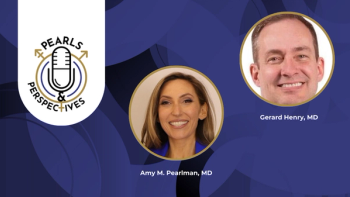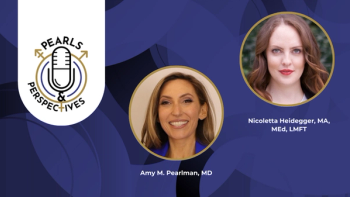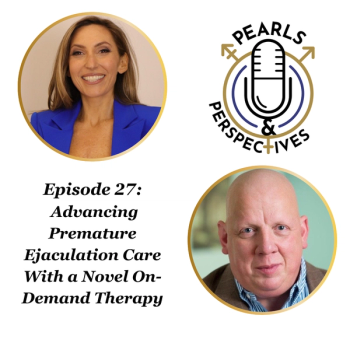
- Vol 51 No 03
- Volume 51
- Issue 03
Dietary supplements for urologic conditions may pose risks to patients

In this interview, Ira Sharlip, MD, explains the potential dangers these products pose and what urologists can do to help protect their patients.
The dietary supplement industry is a large and growing business sector in the US, but some experts fear that some dietary supplements may not only lack efficacy but could also be harmful to patients via adulteration with pharmaceutical products. In this interview, Ira Sharlip, MD, explains the potential dangers these products pose and what urologists can do to help protect their patients. Sharlip is Clinical Professor of Urology at the University of California, San Francisco. He was interviewed by Urology Times® Editorial Council member Arthur L. Burnett II, MD, MBA, The Patrick C. Walsh Distinguished Professor of Urology and Oncology at the Johns Hopkins School of Medicine in Baltimore, Maryland.
How pervasive is the pharmaceutical supplement industry in the United States?
Here are some pertinent statistics. The current total expenditure for pharmaceutical products in the United States is around $425 billion per year. US expenditure for dietary supplements is around $50 billion per year and going up. It's projected that in 2024, the value of the US dietary supplement market will be $56.7 billion. My concern is that despite spending large amounts of money on dietary supplements, American consumers receive little benefit because some, if not many, of these products have minimal value, and some have no value at all. In addition, some “dietary supplements” are dangerous because they are illegally adulterated with pharmaceutical products. When you put a pharmaceutical agent into a dietary supplement, the product is no longer a dietary supplement.
What is the significance of the over-the-counter/dietary supplement industry for the urologic field?
Of the 10 or 11 most heavily marketed dietary supplements in the United States, 4 are aimed specifically at urological or sexual medicine problems. These 4 are dietary supplements intended to improve athletic or physical performance, decreased sexual interest, erectile dysfunction, and low testosterone. So it turns out that urology and especially sexual medicine are disproportionately affected by the most intensive commercial marketing more so than any other field of medicine.
There are concerns that some dietary supplements might not be safe. Do they contain certain contaminants, or are there other ways in which these products are produced that raise concern from you about their safety?
Between 2007 and 2016, the FDA found 776 adulterated dietary supplements that were produced by 146 different companies.1 Of these, 45% were products intended for enhancement of sexual activity, 41% for weight loss purposes, and 12% for muscle building. The most common agents that were found as adulterants were sildenafil in 47%; a drug called sibutramine, which is used for weight loss, in almost 85% of these products, and androgenic steroids in 89%.
And with these substances that are placed within the products, I gather that they have potential risks to the patients, is that right?
That is correct. Let's talk about the inclusion of sildenafil or tadalafil. The first study on clandestine inclusion of PDE5 inhibitors was a small Canadian study published in 2005.2 The authors bought and analyzed 7 over-the-counter products advertised for treatment of sexual dysfunction. Two were contaminated with a significant dose of sildenafil (about 30 mg) or tadalafil (just under 20 mg). That's significant because patients don't know that these products or the hundreds of other adulterated “dietary supplements” found by the FDA were contaminated with PDE5 inhibitors. Many of the patients who use these products are older men who are have cardiovascular disease. It’s easy to imagine a man going to an emergency room for treatment of acute chest pain and not identifying that he used a PDE5 inhibitor because he didn’t know that there was a PDE5 inhibitor in the “dietary supplement” that he had just used. If he is treated in the emergency department with an organic nitrate for angina, he is then at significant risk for life-threatening hypotension or cardiovascular collapse leading to death. I submit that there probably have been deaths that were actually due to the adulterated products. We have no way of measuring how often this has happened and therefore how great a threat adulterated “dietary supplements” are to the public health.
A pertinent study published in the New England Journal of Medicine in 2015 focused on emergency department visits for adverse events related to dietary supplements.3 The authors calculated that there were 23,005 annual emergency department visits due to adverse events from dietary supplements. These visits resulted in over 2000 hospitalizations annually. The most commonly implicated supplements in this study were used for weight loss, decreased energy, and sexual dysfunction.
Are these products being tested in any way, and what sort of monitoring is being done in terms of product safety that you're aware of?
The Dietary Supplement Health and Education Act (DSHEA) of 1994 removed the requirement for the FDA to review dietary supplements and approve them before they are marketed to the public. So any dietary supplement manufacturer can bring a drug to market without supervision or review of its manufacturing process and without identification of possible adulteration. There are at least 75,000 dietary supplements available to the American consumer. It's incumbent on the FDA to prosecute those dietary supplement manufacturers that produce adulterated products. But the FDA budget for oversight of these dietary supplements is way too low for the FDA to review all of the products that come to market in the United States. It is a potentially dangerous situation and the magnitude of the danger cannot be measured.
How effective are these products?
We don't know because dietary supplements are not subjected to randomized, placebo-controlled, double blind studies. My personal opinion is that most are ineffective and many are useless. The drugs that are placed on the consumer market for treatment of sexual dysfunction or low testosterone often get marketed under a suggestive name such as “Rock Hard,” “Hard Steel,” “Rhino 69,” and others. Desperate consumers try them and eventually realize that they don't work very well or at all. Sales go down. Then the supplement manufacturer withdraws the supplement. Sometimes (maybe often) manufacturers reformulate the supplement slightly and/or give it a new name. Then the marketing process is repeated all over again. If one compares current dietary supplements with older supplements, the contents are remarkably similar.
It's important to recognize that laypersons assume, incorrectly, that if a dietary supplement is advertised on television, online or in print publications, the supplement has been reviewed, tested, and approved by some authority as being safe and/or efficacious. But the Dietary Supplement Health and Education Act does not require such vetting. The American public is naive in thinking that dietary supplements have been reviewed and approved before their release to consumer markets. This means that it is up to individual consumers to evaluate the safety andefficacy of dietary supplements. I don't think that laypersons have the scientific acumen to critically evaluate the safety and/or efficacy of these products and their ingredients.
Do you think there are any other precautionary efforts that can be done to reduce the risk?
It’s the responsibility of the FDA to identify and remove clandestinely contaminated dietary supplements and it’s the responsibility of the FTC to identify and terminate fraudulent marketing. I think it's important for federal, state and/or local government agencies to increase public awareness of fraudulent, misleading, and/or deceptive marketing tools in the dietary supplement industry. I'd like to see efforts by public health agencies to inform people about this. Also, I’d like to see political and legislative efforts to increase funding for the FDA to review dietary supplements and for the FTC to oversee deceptive marketing in this industry. Also, I’d like to see the dietary supplement industry do a better job of policing itself to expose fraudulent and contaminated products and illegal practices in its own ranks.
What advice do you have for practicing urologists regarding these products?
Make your patients aware that there are fraudulent, deceptive, and misleading advertising practices in the dietary supplement industry and that there are clandestinely contaminated products which are possibly dangerous to their health. Which products are safe and efficacious is unknown, as is the magnitude of the risk to patients. Patients should be encouraged to rely on treatments proven to be safe and efficacious through pharmaceutical studies and years of experience in the practice of urology and sexual medicine.
References
1. Tucker J, Fischer T, Upjohn L, et al. Unapproved pharmaceutical ingredients included in dietary supplements associated with US Food and Drug Administration warnings. JAMA Netw Open. 2018;1(6):e183337. doi:10.1001/jamanetworkopen.2018.3337
2. Fleshner N, Harvey M, Adomat H, et al. Evidence for contamination of herbal erectile dysfunction products with phosphodiesterase type 5 inhibitors. J Urol. 2005;174(2):636-641. doi:10.1097/01.ju.0000165187.31941.cd
3. Geller AI, Shehab N, Weidle NJ, et al. Emergency department visits for adverse events related to dietary supplements. N Engl J Med. 2015;373(16):1531-1540. doi:10.1056/NEJMsa1504267
Articles in this issue
almost 3 years ago
Move over, MIPS: MIPS Value Pathways are comingalmost 3 years ago
Be careful when charging for patient portal messagesalmost 3 years ago
What is the future of stress urinary incontinence management?about 3 years ago
Consider these factors when weighing retirement feasibilityabout 3 years ago
iRARC adoption is slow but persistent in bladder cancerabout 3 years ago
Expert testimony is necessary to establish standard of careabout 3 years ago
Perceptions of gender equity differ among male and female urologistsabout 3 years ago
The role of guidelines in the management of intermediate-risk NMIBCNewsletter
Stay current with the latest urology news and practice-changing insights — sign up now for the essential updates every urologist needs.






